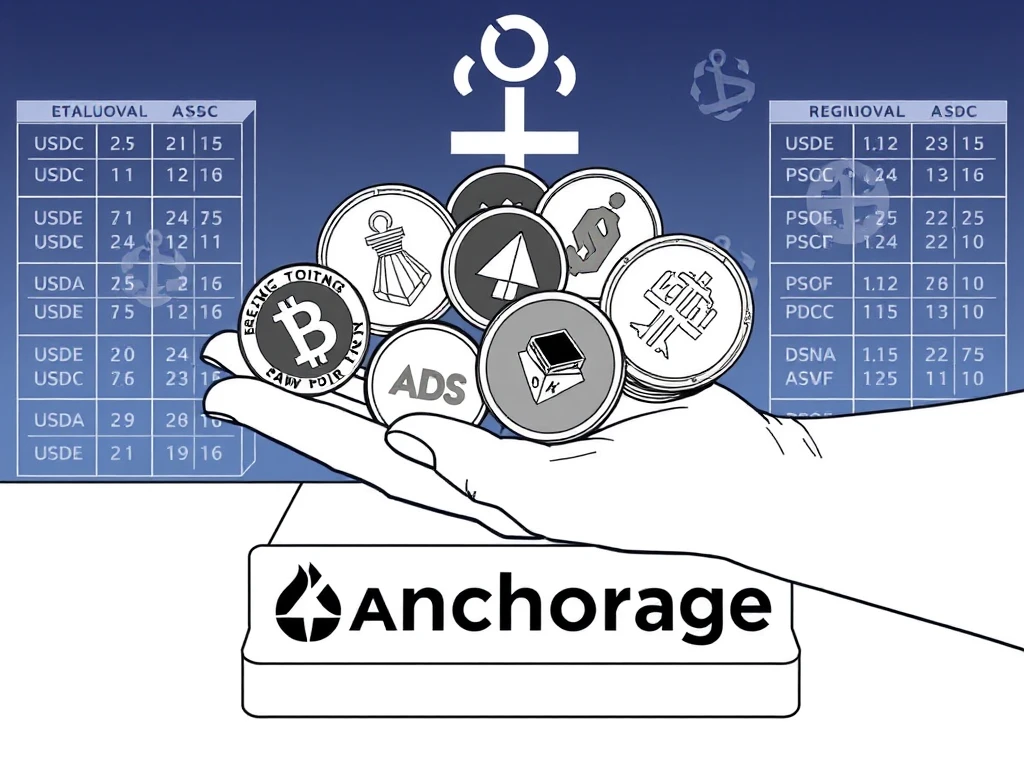Controversial Anchorage Digital Stablecoin Delistings Spark Debate

The world of digital assets is constantly evolving, and recent moves by major players like Anchorage Digital are sending ripples through the market, particularly concerning stablecoin support. This week, Anchorage Digital, known for being one of the first crypto companies with a US banking charter, announced significant changes to its supported assets, sparking considerable debate and criticism.
Anchorage Digital’s ‘Safety Matrix’ and Delisting Decisions
Anchorage Digital revealed a new internal framework, dubbed the ‘Stablecoin Safety Matrix’. The company stated this matrix is designed to evaluate stablecoins based on factors like regulatory guidelines, liquidity, depeg history, and concentration risk. Following this assessment, Anchorage announced plans to phase out support for three specific stablecoins:
- USDC (USDC)
- Agora USD (AUSD)
- Usual USD (USD0)
Rachel Anderika, Anchorage Digital’s head of global operations, explained the decision, stating these tokens no longer meet the company’s criteria for ‘long-term resilience’. She highlighted ‘elevated concentration risks associated with their issuer structures’ as a key concern institutions should evaluate.
Backlash and Claims of Inaccuracy
The decision immediately drew sharp criticism, notably from Nick van Eck, co-founder and CEO of Agora, the issuer behind AUSD. Van Eck took to social media, claiming Anchorage’s decision was based on ‘easily verifiable and known factual inaccuracies’.
He also raised concerns about potential conflicts of interest, suggesting Anchorage failed to disclose a relationship with stablecoin issuer Paxos. Van Eck implied that phasing out competing tokens like AUSD and USDC could potentially benefit Paxos, questioning the true motives behind the ‘Safety Matrix’ framework.
Van Eck stated, “If Anchorage had just delisted USDC and AUSD to prioritize the stablecoins that they have an economic interest in, I would understand it as a business decision… But attempting to delegitimize AUSD and USDC for ‘security concerns,’ while knowingly publishing false information, is unserious and bizarre.”
Regulatory Context: The GENIUS Act and Beyond
Anchorage Digital’s move comes as regulatory landscapes globally are tightening around stablecoins. The company suggested its ‘Safety Matrix’ anticipates potential requirements from proposed legislation like the US Guiding and Establishing National Innovation for US Stablecoins, or GENIUS Act. This bill recently passed the US Senate and has received support from prominent political figures.
While AUSD and USD0 represent a smaller fraction of the stablecoin market (around $700 million combined), USDC holds a significant position with a market cap exceeding $61 billion. Circle, the issuer of USDC, recently had a strong public debut, indicating growing institutional interest in stablecoins.
The regulatory push isn’t limited to the US. In the European Union, the Markets in Crypto-Assets (MiCA) framework is also imposing stricter rules on stablecoins. This has led some platforms to delist tokens like Tether’s USDt, whose CEO, Paolo Ardoino, has stated no plans to register under MiCA, citing perceived risks.
Conclusion: Navigating the Evolving Stablecoin Landscape
Anchorage Digital’s decision to delist certain stablecoins based on its new ‘Safety Matrix’ highlights the increasing influence of regulatory expectations and internal risk assessments within the crypto industry. While Anchorage frames this as a proactive step towards compliance and resilience, the criticism from issuers like Agora underscores the potential for disagreement over evaluation criteria and perceived market impacts. As legislation like the GENIUS Act progresses and global regulation evolves, companies operating in the stablecoin space will continue to face complex decisions regarding asset support and risk management, inevitably leading to further market adjustments and industry debate.








